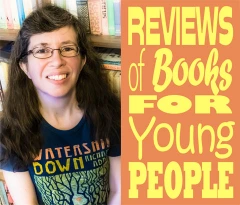A Dream of A World Where No One Goes Hungry
Posted on: January 20, 2015
It was in Bangladesh that Muhammad Yunus met a young craftswoman who needed just twenty-two cents to buy materials and feed her family. Ignored by local banks and in debt to moneylenders, she existed in a cycle of poverty. With a dream of world in which no one goes hungry, Yunus launched Grameen Bank in 1977.
The above description comes from the inside flap of Twenty-two Cents, a picture book from author Paula Yoo. In 2009, Yoo had the privilege of meeting and interviewing Muhammad Yunus. The latter, along with his organization, won the Nobel Peace Prize for using the concept of “micro credit” to help eradicate poverty in Bangladesh.
AUTHOR BACKGROUND
 Paula Yoo is the author of two other award-winning picture books from Lee & Low. According to Cynthia Leitich Smith, Yoo’s initial inspiration for Twenty-Two Cents came from a discussion with editor Jason Lee. He had just read Muhammad Yunus’ autobiography Banker to the Poor: Micro-lending and the Battle Against World Poverty and thought Professor Yunus would be a great biographical subject for Lee & Low Books. Yoo read and loved the book. Like Lee, she was inspired by Muhammad Yunus’ work.
Paula Yoo is the author of two other award-winning picture books from Lee & Low. According to Cynthia Leitich Smith, Yoo’s initial inspiration for Twenty-Two Cents came from a discussion with editor Jason Lee. He had just read Muhammad Yunus’ autobiography Banker to the Poor: Micro-lending and the Battle Against World Poverty and thought Professor Yunus would be a great biographical subject for Lee & Low Books. Yoo read and loved the book. Like Lee, she was inspired by Muhammad Yunus’ work.
According to Mitali Perkins, Yoo next read several other books along with newspaper/magazine articles about Muhammad Yunus and Grameen Bank as part of her research for Twenty-Two Cents. She also interviewed historians and professors who teach college courses about the history and culture of Bangladesh. Most importantly, of course, Yoo had the honor of meeting and interviewing Muhammad Yunus himself when he visited Los Angeles.
CULTURAL BACKGROUND
When Mitali Perkins asked Yoo about the dream response by a reader, Yoo indicated it would be their admiration and respect for a country that has never given up, even in the face of war, famine and natural disaster. “I would hope readers would be inspired to read more about Bangladesh and its beautiful and complex cultural history as well. And of course, to visit a restaurant and eat the awesome food, especially the many different kinds of pithas that Muhammad loved to eat as a child! :)”
The text indicates that Yunus was born in 1940 in a port city in India. For the family and sometimes even the neighbors, his mother fried pithas, a sweet pastry made from rice flour, sugar, and coconut. Other foods common to Yunus were tea and chanachur, a snack made of fried lentils and chickpeas. For fun, Yunas and his friends fly kites made from bamboo and paper, pretend to be soldiers, attend Boy Scouts, and sometimes see a movie. Around Yunus, delivery trucks would rumble past passengers riding in colorful rickshaws.
While growing up, Yunus noticed the poverty around him. Families crammed together in tiny shanties built of bamboo, cardboard, and rusted tin. Beggars wandered side-by-side with businessmen. Homeless mothers huddled with their children in alleyways overflowing with sewage. It was almost impossible for poor families to find enough clean water and food. Yunas noticed how just a few coins would buy enough rice to feed a family for a week.
ONLINE SOURCES
To learn more about Bangladesh, check out Virtual Bangladesh. Started in 1994, the site covers the history and geography, the culture, the language and literature, and even little known facts. For example, below is a video about the liberation war.
While Virtual Bangladesh does include recipes, you might enjoy browsing Bangladeshi Food Kitchen. It contains recipes, information on cooking styles, and a glossary. The two chefs who host the site both grew up in Bangladesh.
Of course, one can’t read Twenty-Two Cents without becoming aware of village banks and their importance. Lee and Yoo discuss village banks in Banking Smarter and Managing Finances. This guest post contains information on loans, loan sharks, micro-credit, and Yunus’ innovative banking methods. Yoo’s book combined with this article would make a great resource for educators in teaching students about economics.




Leave a comment